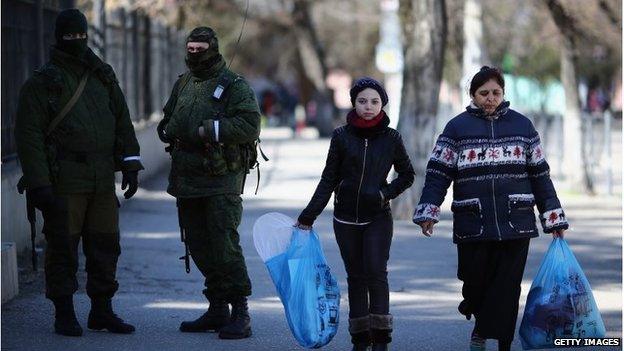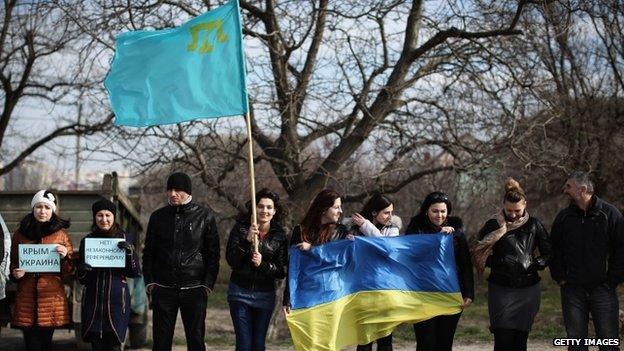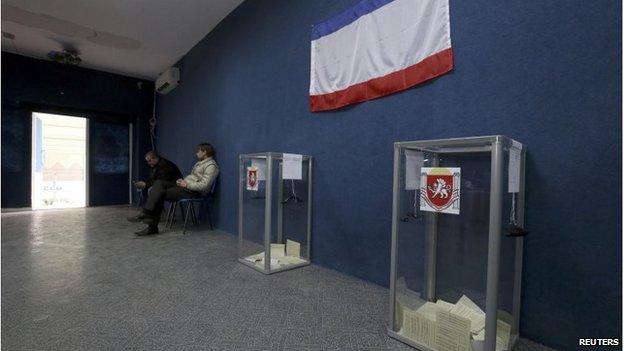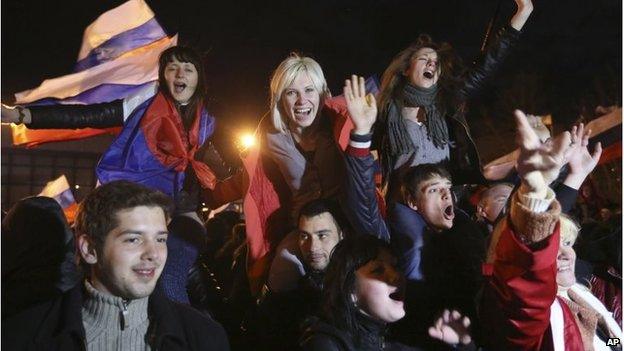Crimean parliament formally applies to join Russia
- Published

Thousands of pro-Russian troops - which Moscow denies are under its control - have been active in Crimea since late February
Crimea's parliament has formally declared independence from Ukraine and asked to join the Russian Federation.
It follows Sunday's controversial referendum which officials say overwhelmingly backed leaving Ukraine.
The government in Kiev has said it will not recognise the results. The US and EU say the vote was illegal and have vowed to impose sanctions on Moscow.
The Crimean peninsula has been under the control of pro-Russia forces since late February.
Moscow says the troops are pro-Russian self-defence forces and not under its direct control.
The crisis follows the ousting of Ukraine's pro-Moscow president Viktor Yanukovych on 22 February.
His decision to reject a long-awaited trade deal with the EU in favour of closer ties with Moscow sparked months of street protests, culminating in deadly clashes.
Ukraine's interim Prime Minister Arseniy Yatsenyuk has called the vote "a circus performance" backed up by "21,000 Russian troops, who with their guns are trying to prove the legality of the referendum".
The vote was boycotted by many among Crimea's minority Ukrainians and Tatars - who constitute about a third of the population - and the election process has been widely criticised.
The BBC's Ben Brown says a "huge number of people in the minority population" abstained from Sunday's vote
Meanwhile, the parliament in Kiev has formally approved the partial mobilisation of 40,000 reservists.
Andriy Parubiy, secretary of the National Security and Defence Council, said what had taken place in Crimea was "blatant aggression" and that the mobilisation would prevent similar action in south-eastern Ukraine, which has seen pro-Moscow rallies in recent weeks.
'Budget doubled'
According to the vote in Crimea's parliament on Monday, Ukrainian laws now no longer apply in the region, and all Ukrainian state property belongs to an independent Crimea.
The peninsula will adopt the Russian currency, the rouble, and clocks will move two hours forward to Moscow time by the end of March.
The document approved by MPs also appealed to "all countries of the world" to recognise Crimean independence.
Crimea's pro-Russia leader Sergei Aksyonov tweeted that in the wake of the vote, Moscow had given Crimea financial assistance amounting to 15bn roubles ($410m: £246m), which he said doubled the region's budget.
He said he was travelling immediately to Moscow to discuss the next steps.

Crimean Tatars say they want the peninsula to stay with Ukraine, fearing further deportations

Many Tatars refused to take part in the poll, which did not give the option of maintaining the status quo

Thousands celebrated the results in Crimean towns on Sunday night
Russia is now expected to fast-track the legislation enabling it to absorb Crimea.
President Vladimir Putin is to address both houses of parliament on Tuesday.
Tatar boycott
Crimea has been under the control of pro-Russian armed forces since late February.
The referendum was called by the Crimean parliament in early March, with voters asked to choose between joining Russia or having greater autonomy within Ukraine.
There was no option for those who wanted the constitutional arrangements to remain unchanged.
Daniel Sandford reports from Crimea: ''Wild scenes in Simferopol''
Crimea's chief electoral official, Mikhail Malyshev, said the vote was nearly 97% in favour of joining the Russian Federation, with a turnout of 83%.
But Crimea's Tatars - about 12% of the population - expressed fears their lives would be worse under the Kremlin.
The Tatars were deported to Central Asia by Soviet dictator Joseph Stalin in 1944. They were only able to return with the fall of the Soviet Union and many want to remain under Ukrainian rule.
Many ethnic Ukrainians - who make up 24% of Crimea's population - also said declined to vote.
The EU - which has already suspended talks on an economic pact with Russia and an easing of visa restrictions - is discussing its response.
Speaking in Brussels, EU foreign policy chief Catherine Ashton said the "so-called referendum" was illegal under Ukrainian international law, and called on Russia to begin a dialogue with Kiev to "try to move to de-escalation as quickly as possible".
The EU "can't simply sit back and say this situation can be allowed to happen", she added.
The bloc hoped to send "the strongest possible signals to Russia, a signal trying to ensure that they understand the seriousness of the situation".
EU foreign ministers are expected to discuss a possible visa ban and an asset freeze against a number of Russian officials.
The White House has described Russia's actions in Crimea as "dangerous and destabilising", and said the international community would not recognise the results of a poll "administered under threats of violence".

Are you in Crimea? Did you vote in the referendum? What are your views on the result? Email us at haveyoursay@bbc.co.uk with the subject heading 'Crimea vote'.